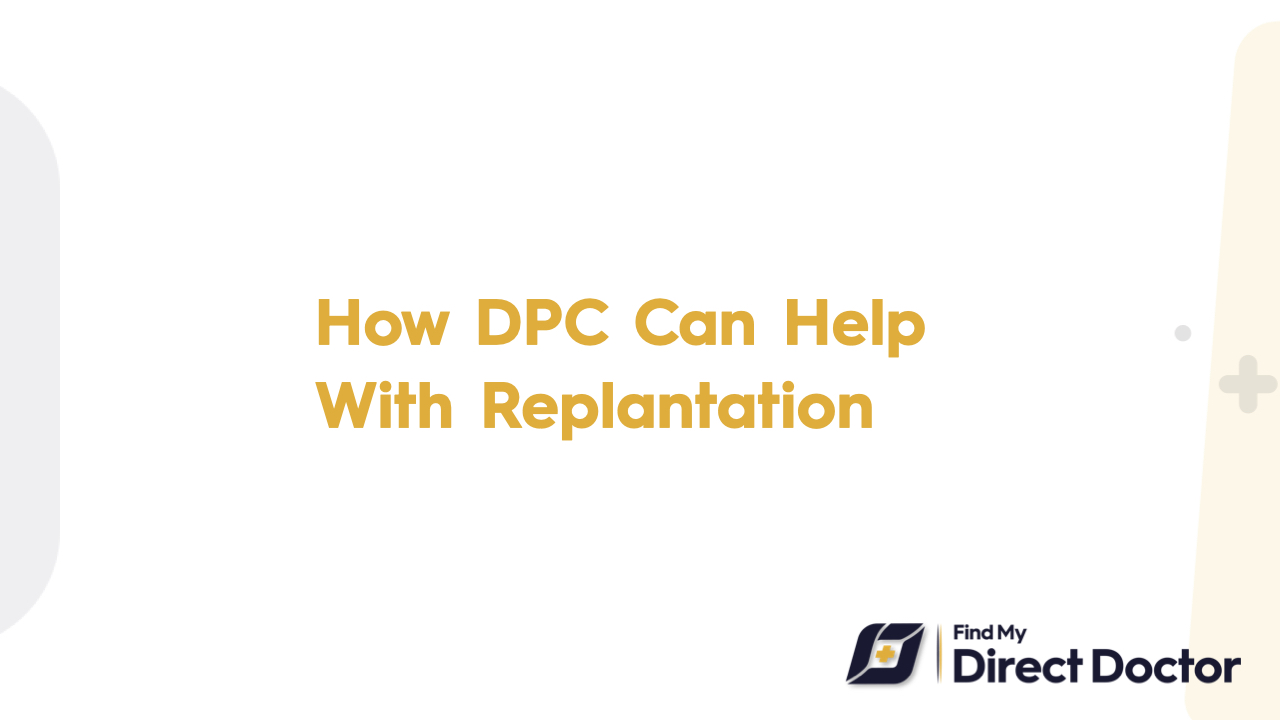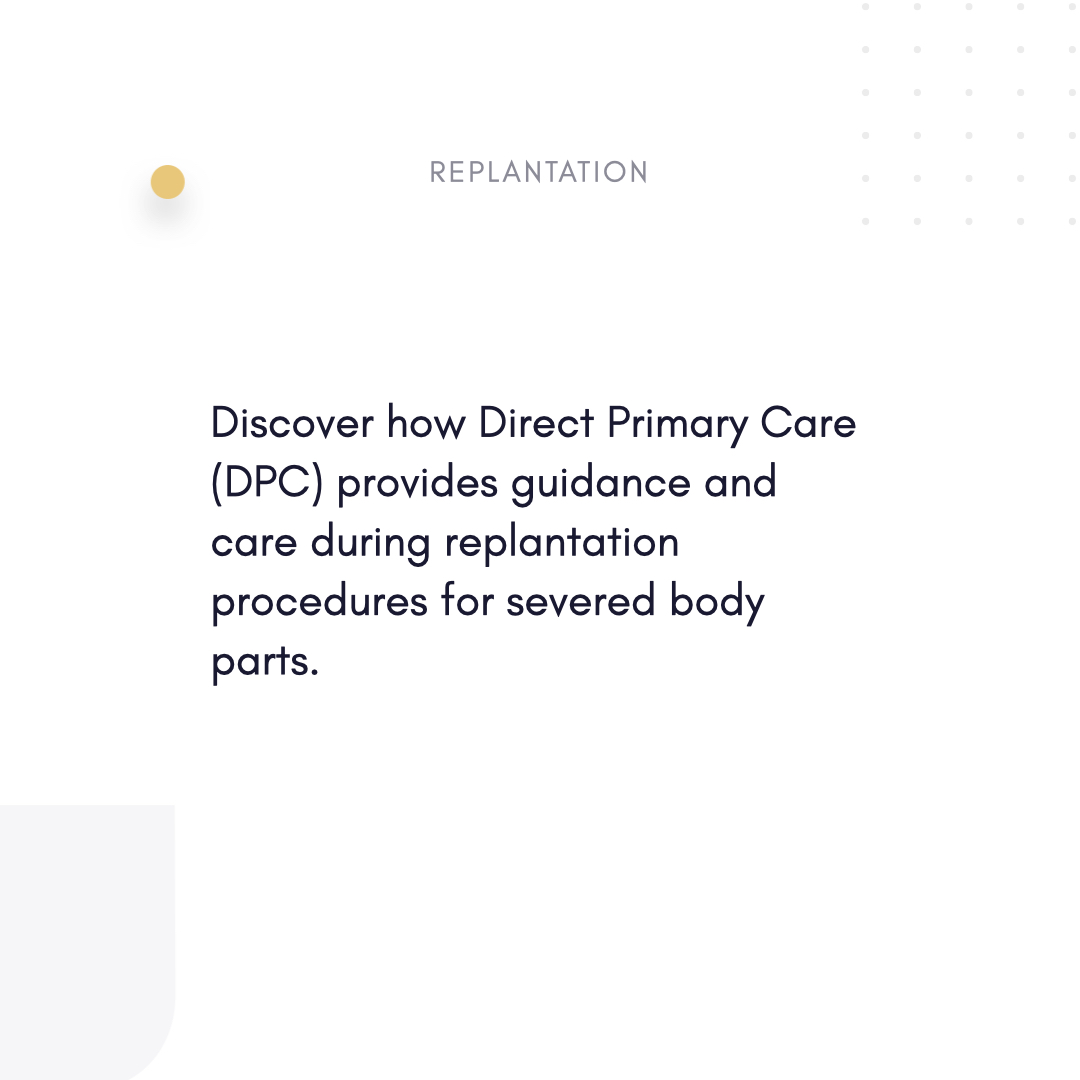Replantation and Direct Primary Care (DPC): Precision, Partnership, Restored Function
Replantation can reconnect a limb or finger if you lose it in an accident. Direct Primary Care (DPC) makes sure that your surgery is planned, costs a lot, and is right for your recovery.

Comprehending Replantation: Reconnecting What is Missing
Replantation surgery uses microsurgery to put back body parts that have been cut off. Important details:
- Uses: Trauma that cuts off fingers, hands, arms, or toes.
- Timing: Best within 6 to 12 hours; how long it lasts depends on how well the tissue is kept.
- Safety: 50–80% chance of success; risks include infection or thrombosis.
Key information:
- Costs: DPC memberships (150–400 USD/month) come with pre-op consultations and follow-ups, but traditional fees (20,000–100,000 USD/surgery) do not.
Risks of delay include:
- Permanent loss, nerve damage, and phantom pain.
How DPC Makes Replantation Work Better
Direct Primary Care (DPC) makes post-trauma care better by putting the patient first and making sure that everything works together well.
Preparing for surgery and making plans for emergencies
- Fast answer: Use telehealth to tell the person how to keep their limb cool, clean, and moist while they are on their way to the ER.
- Surgeons' recommendations: Talk to microsurgery experts during the golden hour.
- Improving your health: Before surgery, make sure your diabetes or high blood pressure is under control to improve your chances of success.
Prices that are clear and help all around
- Comprehensive care that includes: As a member, you get help with planning your rehab, mental health support, and dealing with problems.
- How to save money: Self-pay DPC partnerships can help you save 30% to 50% on the cost of using a facility.
- Family education: Teach how to deal with stress and take care of wounds.
Access to Personalized Recovery and Rehabilitation
- Every day of the week, 24 hours a day: Take care of any swelling, redness, or fever right away.
- Making plans for therapy: You can retrain your senses and get stronger by working with a physical therapist or occupational therapist.
- Keeping an eye on things over time: Get yearly EMG/NCS tests to keep an eye on how well your nerves are healing.
Benefits of DPC for Patients Undergoing Replantation
- No wait times: 95% of DPC patients see specialists within 4 hours, instead of the usual 8 hours or more.
- Continuity: One team is in charge of long-term mental health, pain management, and blood thinners.
- No extra fees: Prices that are easy to understand, like 15,000 USD for digit replantation with a membership.
Real-Life Success Stories
- Case 1: Jake, 28, who cut off his thumb. Jake's DPC team put his thumb back on, and after 6 months of OT, he got back 80% of his grip strength.
- Case 2: Maria, 40, had her toe cut off in a violent way. Maria's DPC provider set up the replantation, which helped her get her balance back and move again.
Questions and Answers: Replantation in the DPC
- Q: Is it possible to put back together any part of the body?
- A: The most common injuries are to the fingers and hands, and how quickly they heal depends on the kind of injury.
- Q: How long does it take to feel better?
- A: It takes 6 to 12 months for nerves to grow back, and physical therapy starts 2 to 4 weeks later.
- Q: Will feeling come back?
- A: A partial recovery is likely; DPC is in charge of retraining the senses.
- Q: What happens if the replantation doesn't work?
- A: DPC talks about different types of prosthetics and revision surgery.
Why DPC is the best place to get help for trauma
The American Society for Surgery of the Hand (ASSH) says that rehab should involve more than one field. DPC gets things done by:
- Lessening issues: Proactive monitoring cuts the number of infections by 40%.
- 70% of DPC patients get their practical use back, while only 50% of patients in the U.S. do.
- Savings on costs: Using bundled self-pay rates saves members between 10,000 USD and 50,000 USD.
Final Thoughts
Replantation in DPC isn't just about putting tissue back together; it's about getting your life back with a team that cares about your mental and physical health. With DPC, you can avoid having to go to different doctors for different things, see the best microsurgeons, and get a rehab plan that changes as you get better. Get trauma care that is as strong as you are, from emergency to empowerment.






